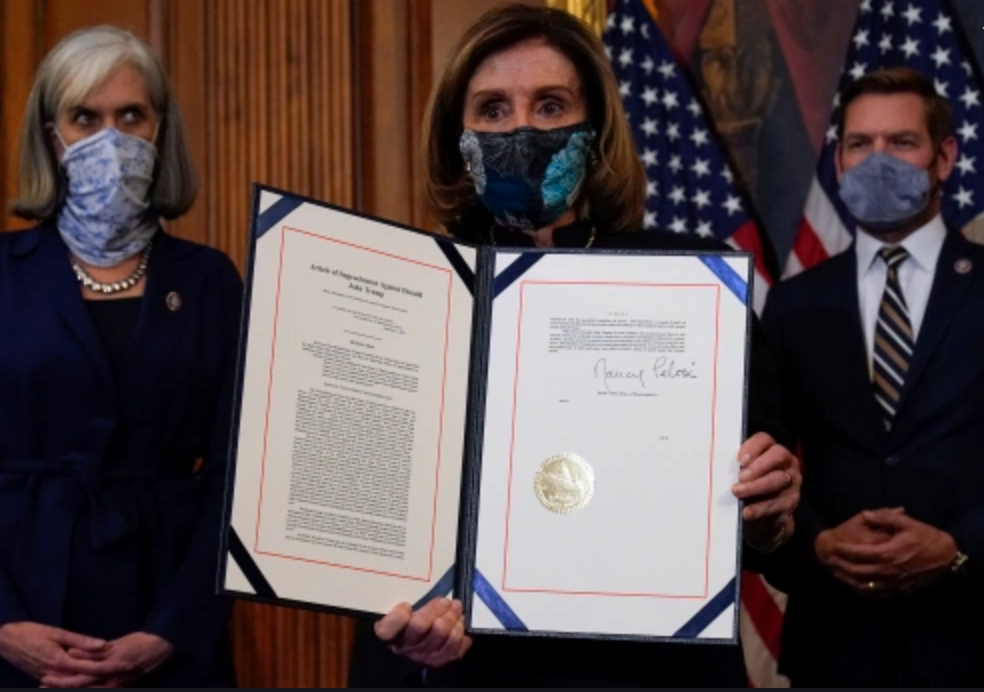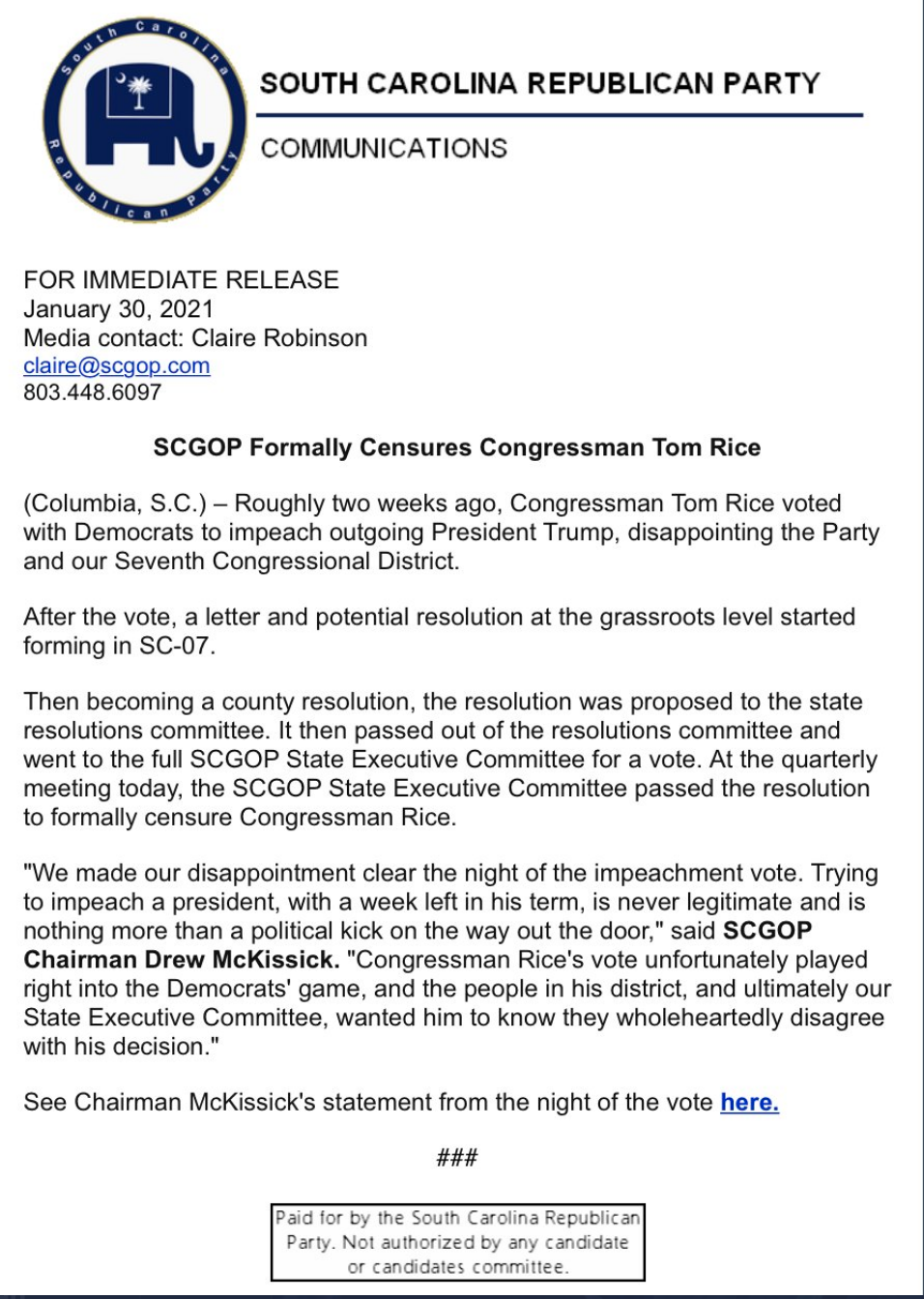House Speaker Nancy Pelosi and her cohorts wasted little time putting forth a second set of articles of impeachment against former President Trump. The resolution, released on Jan. 11, was followed by a ceremony on Jan. 13 where she laid out her case. The trial is set to begin in the Senate on Feb. 9.
During her Jan. 13 ceremonial statement, Pelosi explained, "sadly, with her heart broken with what this means for our country," that "Donald Trump is a clear and present danger to our country," even though he no longer holds office. Those who support this impeachment claim that former President Trump incited violence during his speech for the Save America Rally at The Ellipse on Jan. 6, just before those who attended walked down to the Capitol to protest the electoral college vote in progress.
 Photo/Boston Herald
Photo/Boston Herald
Presumably, Pelosi bases her argument, in part, on Amendment XIV, Section lll which states, that no Officer of the United States "shall have engaged in insurrection or rebellion against the same, or given aid or comfort to the enemies thereof. But Congress may by a vote of two-thirds of each House, remove such disability." The House had asked former Vice President Mike Pence to strip President Trump of his powers through the 25th amendment, to which he replied, "No."
There were 232 votes for impeachment, with ten Republicans voting yea. There were 197 opposed, with zero Democrats voting in opposition. On Jan. 26, Senator Rand Paul eloquently pled with Congress to flatly dismiss impeachment—declaring that a move to impeach is the "antithesis of unity" and adding that "Democrats are wasting the nation's time on a partisan vendetta against a man no longer in office."
The 10 Republicans who voted for impeachment were:
- Liz Cheney of Wyoming
- Tom Rice of South Carolina
- John Katko of New York
- Anthony Gonzalez of Ohio
- Peter Meijer of Michigan
- Adam Kinzinger of Illinois
- Dan Newhouse of Washington
- Fred Upton of Michigan
- Jaime Herrera Beutler of Washington
- David Valadao of California
4 Republicans did not vote:
- Kay Granger of Texas
- Andy Harris of Maryland
- Greg Murphy of North Carolina
- Daniel Webster of Florida
Some Republicans, like Liz Cheney of Wyoming, the highest-ranking GOP woman in the House, and Tim Rice of South Carolina, have both been censured because of their votes. The Wyoming GOP voted unanimously to censure Cheney. There is no tangible punishment associated with censure, although voters may have their say when election day rolls around.
 So. Carolina Republican Party/Resolution/Tim Rice Censure
So. Carolina Republican Party/Resolution/Tim Rice Censure
The impeachment articles state that President Trump is guilty of high crimes and misdemeanors, spreading false information about the election results, statements from his speech at The Ellipse that "incited members of the crowd he addressed...to unlawfully breach and vandalize the Capitol" that injured and killed people and "menaced Members of Congress, the Vice President, and Congressional personnel, and engaged in other violent, deadly, destructive, and seditious acts."
The document also alleges that conversations like the one he had with Georgia secretary of state of Georgia Brad Raffensperger allegedly urged him to "find votes" to help overturn the election. However, taken in context, it does not appear that the President was asking him to find votes that were never there. In sum, the document states that the President "threatened the integrity of the democratic system, interfered with the peaceful transition of power, and imperiled a coequal branch of Government...injur[ing]" the American people.
The House members conclude that "by such conduct, he has demonstrated that he will remain a threat to national security, democracy, and the Constitution if allowed to remain in office, and has acted in a manner grossly incompatible with self-governance and the rule of law," and should never be allowed to run for office again.
During a Jan. 29 interview, former FBI agent Kevin Brock commented on the former President's Jan. 6 speech. He maintains that "for speech to meet the threshold of incitement, a speaker must, first, indicate a desire for violence and, second, demonstrate a capability or reasonable indication of capability to carry out the violence...In Trump's case," he said, "there was neither." He continued, ''I didn't hear a single word about—or anything that would trigger a reasonable person to believe that he was inciting—violence," he said. "He even used the words 'peaceful' and 'respectful'."
In a fair trial, Congress would need to prove that President Trump conspired to commit crimes with the Defendants. The DOJ seems to make the case that the former President was not the cause of the violence at the Capitol with their press release and related criminal complaint on Wednesday.
The DOJ's investigation indicates a timeline that does not fit because the three defendants charged "initiated their communications and coordination in November 2020 and continued through on or about Jan. 19, 2021." None were found to have coordinated with the President or anyone associated with him.
Lawyer Alan Dershowitz agrees. He says, "incitement has a very particular definition which is not what happened" in his Jan. 6 speech. He says, "If Trump didn't know about it, they had planned it without him, then you're missing the causal relationship," said Alan Dershowitz. "It would have happened without his speech as well. So that would be relevant on the issue of causation." Dershowitz added that the President's speech was "constitutionally protected speech."
Trump parted ways with his legal team on Saturday, reportedly because he wishes to defend himself with evidence. The lawyers wanted to limit their case to the argument that he cannot be impeached because he is no longer a sitting President. South Carolina lawyers Butch Bowers and Deborah Barbier and former federal prosecutors Greg Harris, Johnny Gasser, and Josh Howard have left the defense team by mutual agreement. Trump will now be represented by trial lawyers David Schoen and Bruce L. Castor, Jr.
Dershowitz maintains that you cannot "impeach and remove a private citizen and that there would be no trial because, in the current political environment, the Senate will never allow lawyers to present evidence on his behalf." Dershowitz affirms, "Impeachment is not anything Congress says it is...This makes no Constitutional sense."
A group of Constitutional Law Scholars disagrees. They make the case that a President who has left office can be "tried, convicted and disqualif[ied]" for future office.


